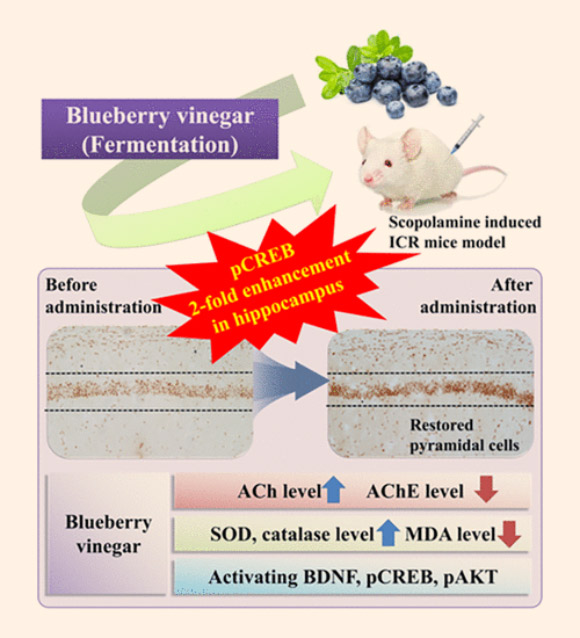Dementia is an umbrella term used to describe severe changes in the brain that cause memory loss. The condition affects 30-50% of the American population over age 85. In the search for new ways to fight cognitive decline, a team of researchers from the Republic of Korea report in the Journal of Agricultural and Food Chemistry that vinegar made from highbush blueberries (Vaccinium corymbosum) might offer some help.

Hong et al demonstrated that the memory protection conferred by blueberry vinegar was linked to activation of brain-derived neurotrophic factor (BDNF)/cAMP response element binding protein (CREB)/serine-threonine kinase (AKT) signaling. Image credit: Hong et al, doi: 10.1021/acs.jafc.7b03965.
Recent studies have shown that the brains of people with Alzheimer’s disease, the most common form of dementia, have lower levels of the signaling compound acetylcholine and its receptors. They have also demonstrated that blocking acetylcholine receptors disrupts learning and memory.
Drugs to stop the breakdown of acetylcholine have been developed to fight dementia, but they often don’t last long in the body and can be toxic to the liver.
Natural extracts could be a safer treatment option, and some animal studies suggest that these extracts can improve cognition. Additionally, fermentation can boost the bioactivity of some natural products.
So Beong-Ou Lim of Konkuk University and co-authors wanted to test whether blueberry vinegar might help prevent cognitive decline.
The researchers administered the vinegar to mice with scopolamine-induced amnesia.
Measurements of molecules in their brains showed that the vinegar reduced the breakdown of acetylcholine and boosted levels of brain-derived neurotrophic factor, a protein associated with maintaining and creating healthy neurons.
To test how the treatment affected cognition, the scientists analyzed the animals’ performance in mazes and an avoidance test, in which the mice would receive a low-intensity shock in one of two chambers.
The treated rodents showed improved performance in both of these tests, suggesting that the fermented product improved short-term memory.
“Although further testing is needed, blueberry vinegar could potentially be a promising food to help treat amnesia and cognitive decline related to aging,” the researchers concluded.
_____
Seong Min Hong et al. Cognitive Improving Effects by Highbush Blueberry (Vaccinium crymbosum L.) Vinegar on Scopolamine-Induced Amnesia Mice Model. J. Agric. Food Chem, published online December 20, 2017; doi: 10.1021/acs.jafc.7b03965







